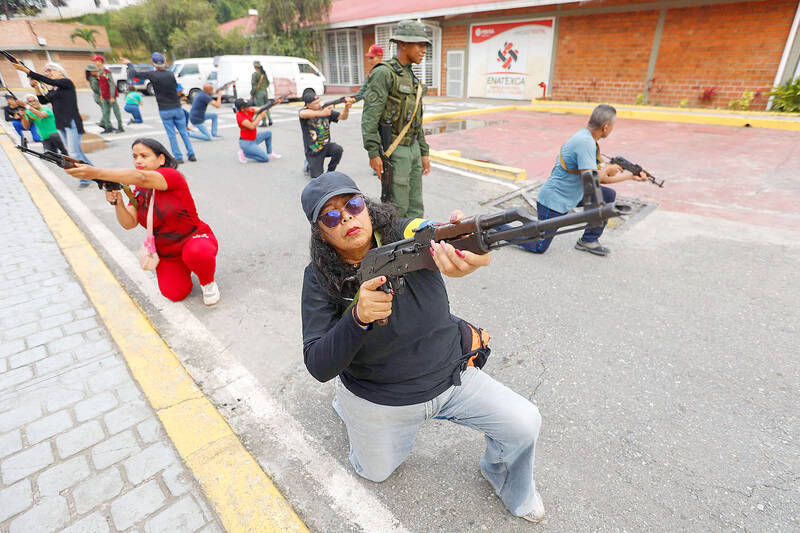Venezuela on Saturday organized a day of military training for civilians in response to the US deployment in the Caribbean, and amid new threats from US President Donald Trump.
About a month ago, Washington deployed warships to international waters off Venezuela’s coast, backed by F-35 jets sent to Puerto Rico in what it calls an anti-drug and anti-terrorism operation.
Venezuelan Minister of Defense Vladimir Padrino Lopez has accused Washington of waging “undeclared war” in the Caribbean, after US strikes killed over a dozen alleged drug traffickers off his country’s coast.

Photo: AFP
Caracas also accused the US of seeking regime change, and stealing its oil and other resources.
In the crammed Petare neighborhood of Caracas, the main avenue was shut down for a day of mini-courses about weapons handling and other “revolutionary resistance” tactics.
“I’m here to learn what I need to learn to defend what is really important to me: my country, my homeland, my nation, Venezuela,” said Luzbi Monterola, a 38-year-old office worker.
“I am afraid of nothing and no one,” Monterola said.
Venezuelan President Nicolas Maduro — who stands accused by Washington of running a drug cartel — has long sought to mobilize civilians in the escalating standoff.
The Petare neighborhood was once the launching point for protests against Maduro’s re-election in July last year, deemed fraudulent by the opposition and much of the international community.
After thousands of volunteers were summoned to military barracks last week for training, Maduro ordered the armed forces to go into the neighborhoods themselves.
However, the show of force was subdued, with about 25 armored vehicles parading in the capital city and fewer trainees.
Maduro on Saturday met with rural workers in the Aragua region, calling on “millions” to “be prepared to take up arms and defend the Bolivarian Republic of Venezuela if it were attacked by the American empire.”
In Petare, soldiers taught volunteers in groups of 30 how to handle weapons. Other topics included how to wear masks, basic first aid and “ideological thought.”
Outside Caracas, training sessions took place in San Cristobal and Barinas, where turnout was also low.
“All of this is about oil, gold, diamonds — our resources,” said 16-year-old John Noriega, who came to the Petare event with his parents. “We will fight for what belongs to us.”
On the coasts, fishing boats cruised alongside naval vessels, state television footage showed.
“Today is a milestone we are marking in the military revolution that we are all writing, the people and the armed forces together. It is a true military revolution,” Lopez said.
Venezuela launched three days of military exercises on its Caribbean island of La Orchila in response to the perceived threat from a US flotilla of seven ships and a nuclear-powered submarine.
Trump warned Venezuela that it would face “incalculable” consequences if it refused to take back migrants he said it had “forced into the United States.”

PRECARIOUS RELATIONS: Commentators in Saudi Arabia accuse the UAE of growing too bold, backing forces at odds with Saudi interests in various conflicts A Saudi Arabian media campaign targeting the United Arab Emirates (UAE) has deepened the Gulf’s worst row in years, stoking fears of a damaging fall-out in the financial heart of the Middle East. Fiery accusations of rights abuses and betrayal have circulated for weeks in state-run and social media after a brief conflict in Yemen, where Saudi airstrikes quelled an offensive by UAE-backed separatists. The United Arab Emirates is “investing in chaos and supporting secessionists” from Libya to Yemen and the Horn of Africa, Saudi Arabia’s al-Ekhbariya TV charged in a report this week. Such invective has been unheard of

US President Donald Trump on Saturday warned Canada that if it concludes a trade deal with China, he would impose a 100 percent tariff on all goods coming over the border. Relations between the US and its northern neighbor have been rocky since Trump returned to the White House a year ago, with spats over trade and Canadian Prime Minister Mark Carney decrying a “rupture” in the US-led global order. During a visit to Beijing earlier this month, Carney hailed a “new strategic partnership” with China that resulted in a “preliminary, but landmark trade agreement” to reduce tariffs — but

SCAM CLAMPDOWN: About 130 South Korean scam suspects have been sent home since October last year, and 60 more are still waiting for repatriation Dozens of South Koreans allegedly involved in online scams in Cambodia were yesterday returned to South Korea to face investigations in what was the largest group repatriation of Korean criminal suspects from abroad. The 73 South Korean suspects allegedly scammed fellow Koreans out of 48.6 billion won (US$33 million), South Korea said. Upon arrival in South Korea’s Incheon International Airport aboard a chartered plane, the suspects — 65 men and eight women — were sent to police stations. Local TV footage showed the suspects, in handcuffs and wearing masks, being escorted by police officers and boarding buses. They were among about 260 South

Chinese President Xi Jinping’s (習近平) purge of his most senior general is driven by his effort to both secure “total control” of his military and root out corruption, US Ambassador to China David Perdue said told Bloomberg Television yesterday. The probe into Zhang Youxia (張又俠), Xi’s second-in-command, announced over the weekend, is a “major development,” Perdue said, citing the family connections the vice chair of China’s apex military commission has with Xi. Chinese authorities said Zhang was being investigated for suspected serious discipline and law violations, without disclosing further details. “I take him at his word that there’s a corruption effort under